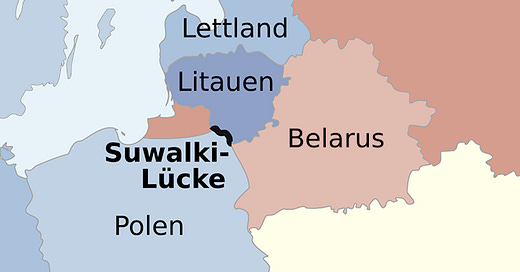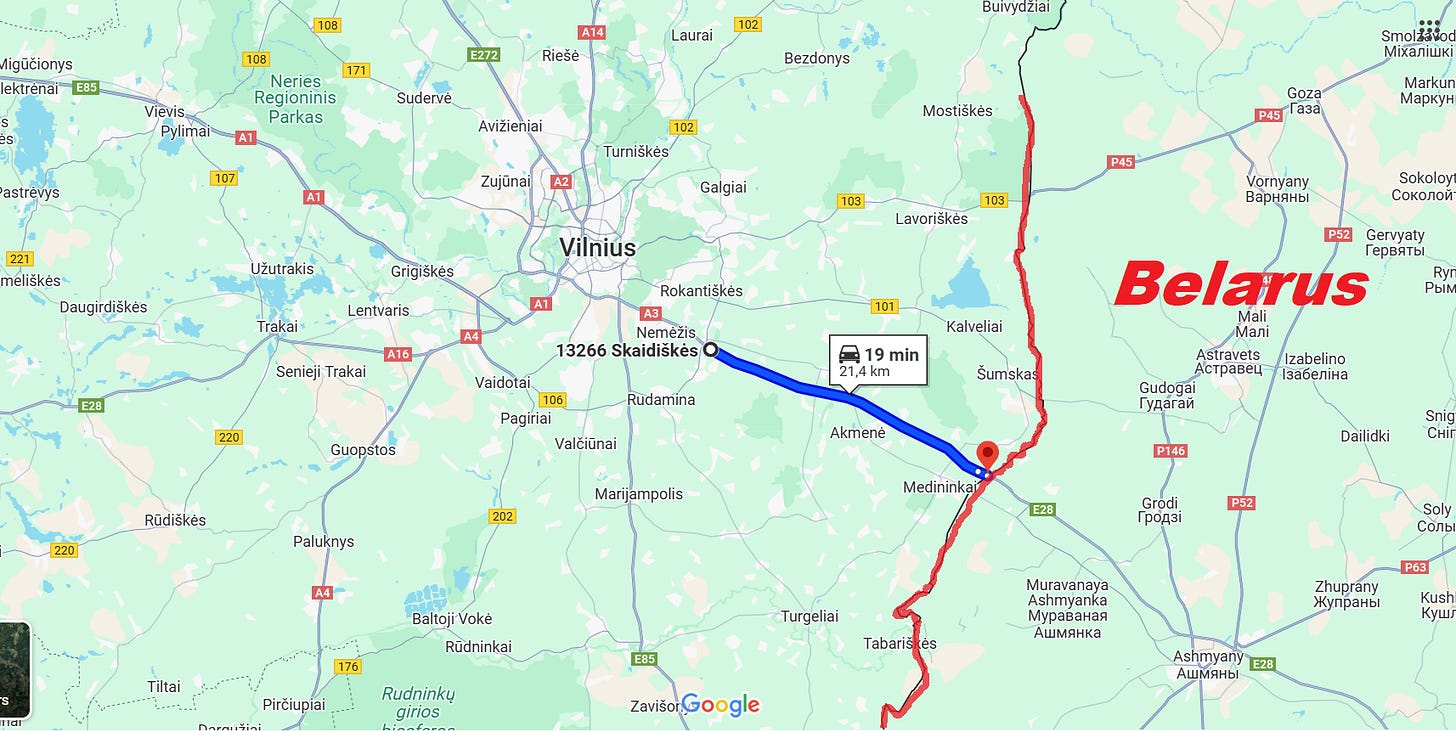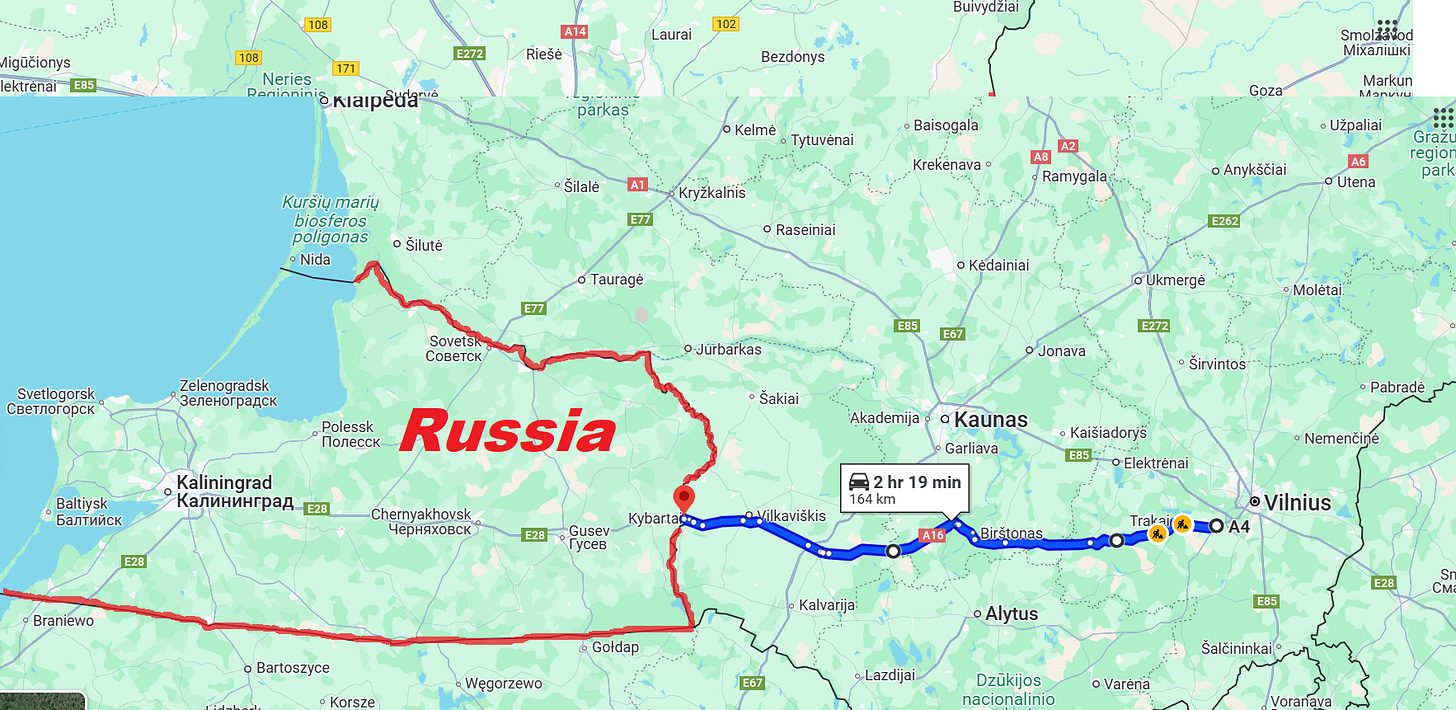Putin’s Best Shot at Beating NATO
Germany is answering with its first permanent foreign deployment since WWII — a 5,000-strong brigade to hold the line in Lithuania.
I had just one big ask for the Germans.
Reform their debt rules. Free up the money needed to defend democracy — both Germany’s and Europe’s. And finally get serious about stopping fascist forces, from the west and the east.
Last week, German political parties — all except the far left and far right — understood what was at stake. They came together and delivered the reform. Before I could even finish exhaling in satisfaction, Berlin pivoted to the next front: reforming the EU to limit the influence of Putin’s chief saboteur inside the bloc. It’s a long and complicated road to kneecap Viktor Orbán, the quasi-dictator in Budapest, but Germany has taken the most important first step: openly calling for structural EU reform.
And now, they’ve acted again — this time to protect the most vulnerable stretch of NATO’s eastern frontier.
Most people don’t realize what the Suwałki Corridor really is: a narrow strip of land, just 65 kilometers (40 miles) wide, along the Poland–Lithuania border. It’s named after the town of Suwałki in northeastern Poland — and it is the only land route connecting NATO forces in Poland to the Baltic states. Flanked by Russian forces in Kaliningrad to the northwest and Belarusian forces to the southeast, it’s Europe’s most fragile fault line — a place where a single Russian provocation could cut off the Baltics from the rest of NATO in a matter of hours.
It’s a critical vulnerability — but there’s an even bigger problem. One that could completely paralyze NATO’s ability to respond to a Russian invasion. And if I were advising Vladimir Putin, it’s the first place I’d tell him to hit if he wanted to win a limited war against NATO.
Because the only real path to victory for Russia in a conventional fight with the alliance is to stop NATO from responding at all.
That place is Vilnius. The capital of Lithuania — the country’s largest city, political center, and cultural heart. With a metro population of 800,000, it sits just 30 kilometers from the Belarusian border.
It takes just twenty minutes to drive from that border to the Vilnius metro area. If the line is breached after breakfast, Russian or Belarusian forces could surround the Lithuanian government by lunch. And by dinner, NATO will be left scrambling — staring at a hostage crisis on a national scale, with nearly a million civilians caught inside.
And here’s the terrifying part: a successful strike on Vilnius might not trigger a wider war — it could do the opposite. By turning the capital into a civilian trap, Russia could force NATO into paralysis — unable to act decisively for fear of massive civilian casualties. That’s how a war that should be total could stay limited — not because NATO wants it that way, but because it has no other choice.
And it doesn’t have to come from just one direction. If I were Putin, I wouldn’t march toward Vilnius in a straight line — I’d come from four directions. Or as many as possible.
The goal wouldn’t be to destroy Vilnius — it would be to encircle it. Fast. To make the Lithuanian government collapse before NATO can coordinate a response. To force the alliance into a political crisis, staring down a fait accompli.
This is how you win a limited war: not by overpowering NATO, but by confronting it with impossible choices.
Lithuania — and especially its capital — has almost no strategic depth. There’s simply no room to absorb a Russian invasion. A small incursion might be stopped. But if Putin rolls in with the same force he used at the start of the Ukraine war — dozens of brigades crossing at once — the fall of Vilnius becomes less a possibility and more a certainty. It would be nearly impossible to stop.
The only real way to stop Russia is to prevent them from crossing the border in the first place. Sure, it’s important to reinforce Lithuania’s entire land border with both Russia and Belarus. But that won’t be enough if Putin believes that’s the only line standing in his way — and if Lithuania’s defenses can’t hold that line under pressure.
Deterrence is the key. Not response — deterrence.
Lithuanian defense minister Dovilė Šakalienė warned just this week: “Let’s not have any illusions. Let’s not lie to ourselves that Russia is going to be done after Ukraine. Russia will use this time following a ceasefire to speed up its military capabilities. They already have a huge, battlefield-trained army, which is going to get even bigger.”
She’s right. The Baltics won’t be safer after a ceasefire — they’ll be even more vulnerable. Which is why Germany’s latest move matters. Not just symbolically, but strategically.
Berlin has launched its first permanent foreign troop deployment since World War II — a 5,000-strong armored brigade stationed in Lithuania. It’s a historic break from Germany’s postwar reluctance to station combat troops abroad. Activated on Tuesday just outside Vilnius, the new 45th Armored Brigade will be permanently based in Rūdninkai, about 30 kilometers south of the capital. Until construction is complete in 2027, troops will operate from temporary bases across the country.
Commanded by Brigadier General Christoph Huber, the unit includes not just frontline forces but full operational support: medical teams, signal units, logistics, and a command center. Right now, only 150 German troops are on the ground — that’s expected to rise to 500 by the end of this year.
It’s a good decision. An essential one. But Berlin needs to move faster — much faster. The permanent base must be ready sooner. Troop levels should surpass 1,000 by the end of this year. Because the moment Britain and France deploy peacekeepers to Ukraine — the very moment a ceasefire is in place — Germany must move at least one full brigade into Lithuania.
It has to be simultaneous. Delays will cost deterrence.
Because once the guns go quiet in Ukraine, Putin will use the pause to prepare for the next war. And this time, he’ll know any new invasion of Ukraine risks direct conflict with Britain and France — essentially war with NATO.
That’s why Vilnius will become the next logical target. A successful attack there would slice the Baltics off from Europe — and force NATO to fight a war on Putin’s terms.
Sending peacekeepers to Ukraine is only one half of the mission. The other half — equally vital — is protecting Vilnius. Because once Vilnius is encircled, there will be no easy way back.








One of your most brilliant and well-informed east European posts, Shankar. It makes me hope that European leaders read your column. The numbers you cite for Germany's brigade are too small and slow though, as noted by people below. Poland's military is far more ready, and the alliance with the Baltics more established.
All of this because the delusional Trump regime can't (or won't) understand that Putin is our enemy, and needs to be handed a sound defeat in Ukraine. The kind of defeat that leads to regime collapse, just like the USSR's loss in Afghanistan did so long ago. The US and her allies should be bleeding Russia, not trying to make peace with her.